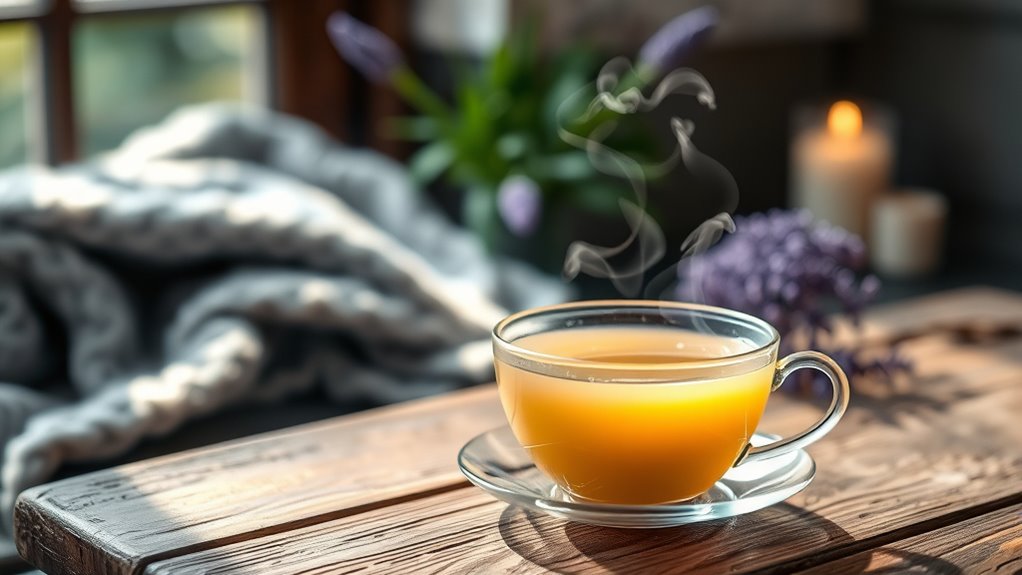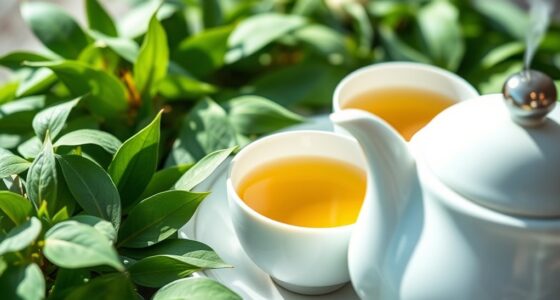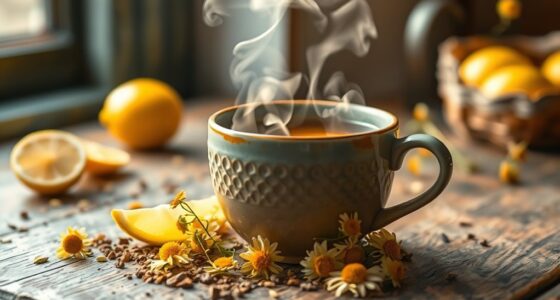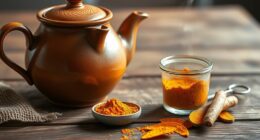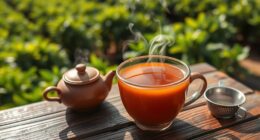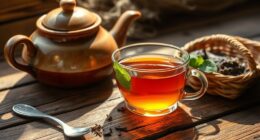For stress relief and relaxation, herbal teas like chamomile, lavender, and peppermint are excellent choices. Chamomile helps calm your mind and promotes sleep, while lavender offers soothing floral aromas to ease tension. Peppermint provides mental clarity and physical relaxation with its invigorating scent. Incorporating these teas into your daily routine can transform your self-care moments into calming rituals. Keep exploring to discover more ways these teas can help soothe your stress naturally.
Key Takeaways
- Lavender and chamomile teas are popular herbal infusions known for their calming and sleep-inducing properties.
- Peppermint tea offers mental clarity and physical relaxation, making it ideal for stress relief.
- Valerian root tea has earthy tones and promotes relaxation, reducing anxiety and aiding sleep.
- Incorporating special teaware and soothing rituals enhances the calming effects of herbal teas.
- Regularly enjoying herbal infusions supports mental well-being and stress management through mindful practices.

Are you looking for a natural way to unwind after a busy day? If so, herbal infusions can become your go-to solution for relaxation. These herbal teas are more than just beverages; they’re tools for creating calming rituals that help you disconnect from daily stress. The act of preparing and sipping herbal infusions encourages mindfulness, turning your tea-drinking into a moment of self-care. Whether you prefer a warm cup in the evening or a soothing ritual to start winding down, herbal infusions are versatile and effective.
Lavender tea is a classic choice when it comes to stress relief. Its gentle floral aroma has been celebrated for centuries for its calming properties. Drinking lavender infusion can help reduce anxiety and promote a sense of tranquility. As you prepare it, focus on the scent and the warmth of the tea, turning the act into a calming ritual rather than just a routine. Chamomile is another popular herbal infusion renowned for its natural sedative effects. It relaxes your muscles, eases tension, and can even improve sleep quality. Sipping on chamomile in the evening creates a peaceful atmosphere, helping your mind and body let go of the day’s worries.
Lavender and chamomile infusions promote tranquility, relax muscles, and ease tension for peaceful, restorative evenings.
Peppermint tea offers a slightly different approach, providing both mental clarity and physical relaxation. Its invigorating scent can help clear your mind, while the cooling sensation relaxes tense muscles. Incorporating peppermint into your calming rituals can make your tea time feel revitalizing and invigorating, even as it soothes stress. Valerian root tea is another herbal infusion that’s often used to combat anxiety and promote sleep. Its earthy aroma and comforting taste create a grounding experience, helping you ease into a restful state.
When you turn tea preparation into a calming ritual, you’re not just drinking a herbal infusion—you’re creating a moment dedicated to your well-being. Use a special teapot or cup, light a candle, or play soft music to enhance the experience. The slow, mindful process of brewing and sipping helps signal to your brain that it’s time to relax. Over time, these calming rituals can become a cherished part of your daily routine, helping you manage stress more effectively.
Incorporating herbal infusions into your lifestyle transforms simple tea-drinking into a powerful way to nurture your mental health. The benefits of herbal teas are supported by their various medicinal properties, which can aid in reducing stress and promoting relaxation. With each calming ritual, you give yourself permission to pause, breathe, and reconnect with a sense of peace. So, next time stress piles up, reach for an herbal infusion, create a calming ritual, and let it guide you into a more relaxed state of mind.
Frequently Asked Questions
Are Herbal Teas Safe for Pregnant Women?
Herbal tea safety during pregnancy varies depending on the herbs involved. You should be cautious and consult your healthcare provider before drinking herbal teas, as some herbs may cause contractions or other complications. Pregnancy considerations include avoiding teas with herbs like chamomile, peppermint, or hibiscus unless cleared by your doctor. Always check ingredient labels and opt for pregnancy-safe options to guarantee both your safety and your baby’s well-being.
Can Tea Interfere With Medication?
Think of your medications and herbal teas as dancers on a crowded floor; if they don’t coordinate, a misstep could happen. Tea can interfere with medication interactions, affecting how drugs work or causing side effects. Always check herbal tea safety and talk to your healthcare provider before mixing teas with medications. This way, you keep your health in harmony and avoid unexpected surprises.
How Long Does It Take to Feel the Effects?
You’ll likely start feeling the effects of stress-relief teas within 15 to 30 minutes, but the timing of effects varies based on personal sensitivity and the type of tea you choose. Some may notice relaxation sooner, while others might take longer. To experience the full benefits, sip your tea slowly and be patient, as individual reactions differ. Adjust your expectations based on your body’s response for the best calming experience.
Are There Any Side Effects of Stress-Relief Teas?
Stress-relief teas are generally safe, but you should watch for potential allergic reactions like itching or swelling. Some teas contain caffeine, which might cause jitters or disrupt your sleep if consumed in excess. Always check ingredients, especially if you’re sensitive or allergic. It’s best to start with small amounts to see how your body reacts, and consult a healthcare professional if you have concerns.
Which Teas Are Suitable for Children?
Like the gentle whisper of a lullaby, some child-friendly herbal infusions soothe young hearts. Safe herbal options for kids include chamomile, lemon balm, and peppermint, which are known for their calming effects. Always consult a pediatrician before offering any herbal tea, and verify the infusions are caffeine-free and properly prepared. These gentle remedies can help children relax and feel comforted, just like a warm hug in a cup.
Conclusion
So, next time life feels overwhelming, let these teas be your gentle anchors. Just like a calming tide returning to shore, they help you find your balance amidst the chaos. Sip slowly, breathe deeply, and embrace each moment of peace. Remember, these teas aren’t just drinks—they’re symbols of serenity, guiding you back to yourself whenever stress tries to pull you under. With each cup, you’re nurturing a quiet strength that stays with you long after the last sip.

